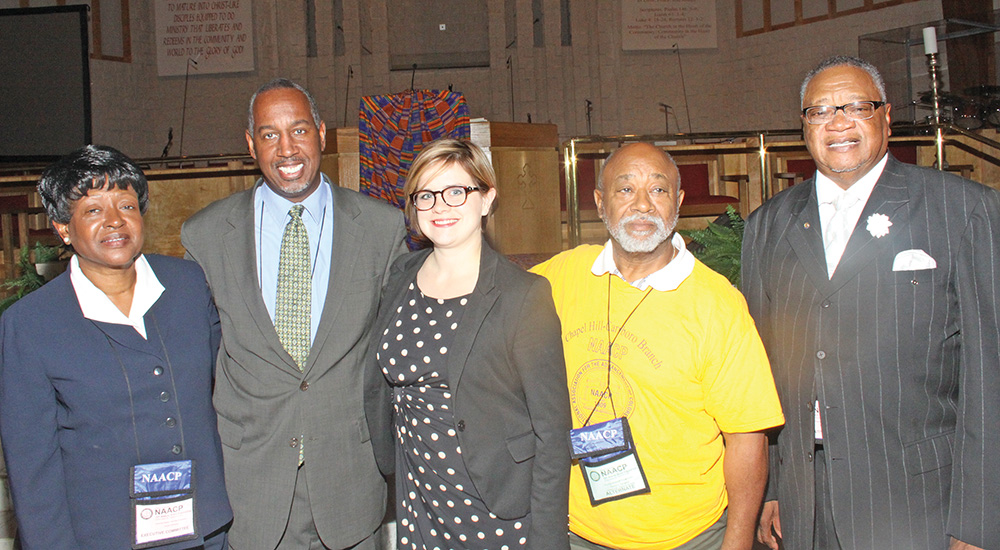 Rev. Dr. William J. Barber, N.C. NAACP President; Rev. Mazie Ferguson of Greensboro; & Rev. Michele Laws., N.C. NAACP Executive Director. Photo by Charles Edgerton / Carolina Peacemaker
Rev. Dr. William J. Barber, N.C. NAACP President; Rev. Mazie Ferguson of Greensboro; & Rev. Michele Laws., N.C. NAACP Executive Director. Photo by Charles Edgerton / Carolina PeacemakerWINSTON SALEM - The North Carolina NAACP held its 72nd Annual State Convention in Winston-Salem last weekend. The three-day convention was filled with discussion on voting rights, the state budget, housing and education with guest speakers ranging from members of the U.S. Congress, journalists, writers, civil rights activists and faith leaders.
Winston-Salem Mayor Allen Joines presented N.C. NAACP State President, Rev. Dr. William J. Barber, II, with the key to the city at Friday’s luncheon, where MSNBC correspondent Joy-Ann Reid served as keynote speaker.
The theme for this year’s convention was “Pursuing Liberty in the Face of Injustice.”
 Rosanell Eaton & Ari Berman. An interview with Eaton is featured in Burman’s book. Photo by Charles Edgerton / Carolina Peacemaker[/caption]Much discussion was centered around the 2013 Voter ID law passed by the N.C. General Assembly. That law changed voting procedures across the state, including requiring all voters have a state issued ID to vote in 2016.
Rosanell Eaton & Ari Berman. An interview with Eaton is featured in Burman’s book. Photo by Charles Edgerton / Carolina Peacemaker[/caption]Much discussion was centered around the 2013 Voter ID law passed by the N.C. General Assembly. That law changed voting procedures across the state, including requiring all voters have a state issued ID to vote in 2016. “This is an important time in our history regarding voting rights,” noted Reid.
Reid suggested voter registration be automatic for new drivers, so you are registered once you turn 18. You then have the option to opt out.
“We as voters have incredible individual power because elected officials will only care if we demand it. We have to exercise our right to democracy because it’s fragile and it can always be taken away,” said Reid.
Journalist and contributing writer for The Nation magazine, Ari Berman followed up the luncheon with a discussion of his book, “Give Us The Ballot: The Modern Struggle for Voting Rights in America,” written about the voting rights struggle in North Carolina following the 50 years after the historic March on Selma.
“I think so much of civil rights history and voting rights history ends with the march in Selma, and we’re never told what happened all the years after that. There was a whole 50 year struggle that hasn’t been told,” said Berman. “When people ask me where is the civil rights movement now. I tell them it’s in North Carolina.”
Berman noted that 2016 will be the first election without the full protection of the Voting Rights Act of 1965. He said that North Carolina doesn’t have a voter fraud problem, it has a voter registration problem.
“Now we have five states with new election laws in place for the presidential election. There could be new laws passed closer to elections, could be things done on the county level to make it harder. We’re not lacking ideas, we’re lacking ways to implement them,” said Burman.
Convention participants also discussed the NAACP’s long standing history with the church and how the organization can continue its social justice mission while partnering with other organizations.
 Members of the NAACP Religious Affairs Committee: Joyce Johnson, Rev. Jimmy Hawkins, Rev. Robin Tanner, Min. Robert Campbell & Rev. Cardes Brown. Photo by
Members of the NAACP Religious Affairs Committee: Joyce Johnson, Rev. Jimmy Hawkins, Rev. Robin Tanner, Min. Robert Campbell & Rev. Cardes Brown. Photo byFounded in 1909, the NAACP is the nation’s oldest and largest civil rights organization. The NAACP’s principal objective has been to ensure the political, educational, social and economic equality of minority group citizens of the United States and eliminate race prejudice.
“There needed to be foundational strength for an organization whose mission would go past its inception,” said Rev. Cardes Brown, chairman of the N.C. NAACP Religious Affairs Committee. “We fight for the civil rights of every individual.”
The origins of the NAACP has deep ties to the church with the organization being led by faith leaders and many events and meetings organized and held at the church.
“The NAACP and the church are one in many ways. There would have been no NAACP without the church. The NAACP often serves as the mission arm of the church,” said Rev. Jimmy Hawkins of Covenant Presbyterian Church in Durham. “There is no competition, we need each other to survive.”
For more information on upcoming NAACP events, visit www.naacpnc.org.